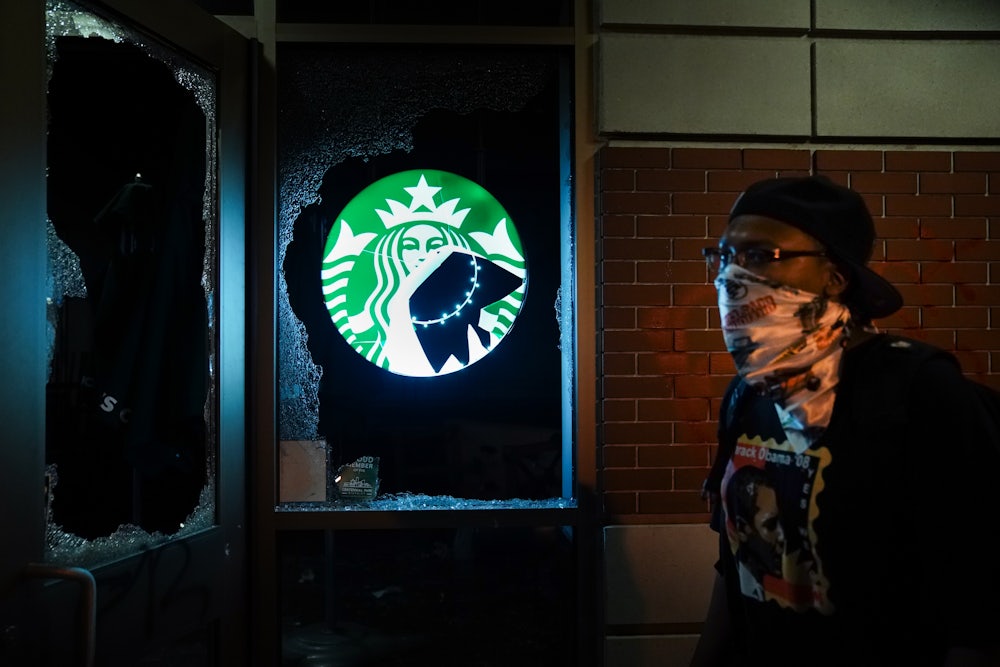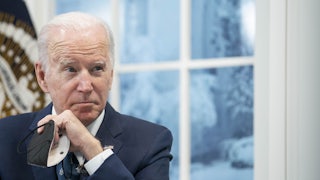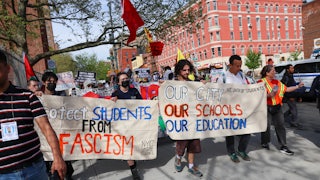Democrats need a 2022 message and agenda. Right now, it’s missing in action.
The party needs to resist the temptation to rest on its laurels with a backward-looking message that simply hails Democrats’ important record of getting shots in arms and checks in the mail. Compelling political messages should offer a forward-looking agenda and a clear contrast with your opponents. Those messages need to speak to the head and to the heart. And they need to speak to people who aren’t already on your side.
That message is readily available, for any who want to heed it. It’s corporate greed, stupid. But importantly, more than revealing and exposing corporate greed, Democrats have to clear the high bar of being willing to do something bold about it.
The message of corporate accountability sounds simple because it is. And yet it’s hard to comprehend how Democrats are failing to read the room.
All across America, there is a wildfire progressive movement going on right now. It is the Starbucks workers of America. In more than 80-plus stores across 20-plus states, these courageous leaders are spotlighting corporate greed. Here you have a “progressive” company that touts record earnings, price hikes on customers, wild increases in CEO pay—then simultaneously does everything it can to bust a successful worker organizing movement. It is illegally retaliating against workers who advocate for a union.
And so now I ask you: What have you heard from national Democratic leaders on this? I’m not talking about a nice tweet here or there. I’m talking about leaning into this as a major national message about the economy we believe in. These workers should be invited to meet with President Biden at the White House; there should be House and Senate committee hearings and measures that express solidarity with them and accountability over Starbucks; there should be rallies in all these congressional districts to get the workers’ backs. In short, people need to see and hear that Democrats stand with Starbucks workers.
Those things are not happening yet. Why? It reveals the problem afflicting the Democratic Party. When you stand boldly with these workers, it necessarily entails a fight against a large corporate power; it welcomes friction and disruption with exploitative business models. Not all Democrats are game for that.
Not that we need polling to tell us the obvious, but here it is: 73 percent of Americans are dissatisfied with the size and influence of major corporations, an increase from 58 percent 15 years ago. Supermajorities think lobbyists and major corporations have too much power, and supermajorities also want regulatory actions to protect the public.
People aren’t naïve. They know what’s happening. All around them, they see the problems driven by corporate hunger for profits: failing power grids, arbitrary price hikes, pandemic profiteering, prescription drugs out of reach, outsourced manufacturing and supply chains, the crushing of worker organizing, and politicians on the take.
Over the last few decades, the prevailing Democratic Party ideology—commonly referred to as neoliberalism—suggested that the ideal agenda was one that should seek big business support for policy aims. Public-private partnerships were to be heralded, and confronting corporate power was frowned upon because politicians shouldn’t be telling business leaders what to do.
The consequence of that mindset is that the Democratic Party lost its way on an economic message based on values that we aspire for in society. Values like the dignity of work, equality of opportunity, and fairness in the application of law.
Instead, too many Democrats deferred to business leaders, who filled in the policy and values gaps with desires to constrain government spending, outsource key functions, reduce “burdens” on business, and control deficits. And then they cheered when macroeconomic indicators suggested gains, even while working people were living harsher lives of despair.
Those neoliberal messages conveniently crowded out any role for government to serve as a counterweight to corporate power.
It’s time to boldly change that with a real corporate accountability agenda that people can believe in.
After two years of a pandemic misery where people saw essential workers literally die to try to earn a living while the rich and powerful got even bigger and wealthier, people are rightly left wondering: Are there any penalties for corporate greed running amok? And honestly, the answer has been no.
The corporate class has been providing a comfortable feeding trough for political elites who want in on its party, and the working class is wondering if there’s anyone who wants to fight for them in a serious way. So if we’re going to win elections by persuading people to vote for us, it’s going to require more than broad-based popular class-based messaging; to gain credibility, we need voters to see a willingness to take on the tough fights.
Accountability must be the mindset. Think about that word. If there is truly to be accountability for corporate abuses, there needs to be a penalty. In a society of deep power imbalance, we need to show a fight for the underdogs by, among other things: investigating and criminalizing white-collar crime; using government contracting power to reward companies that do right and punish those that do wrong; bringing back American traditions around price constraints to rein in profiteering; and publicly naming and shaming corporations—like Starbucks—that engage in practices that violate our values.
Democrats need to look and feel like the party that cares about accountability. Part of projecting that is showing that you’re willing to take uncomfortable actions that come at some personal inconvenience or expense, like banning the trading of individual stocks, or firing a government official who isn’t doing a good job, or rejecting corporate contributions.
A muscular, corporate accountability message and agenda is the right recipe for the current ailments afflicting the Democratic Party. There’s very little time left to change course before voters deliver an angry rejection of a governing majority that didn’t do enough to flex power.








